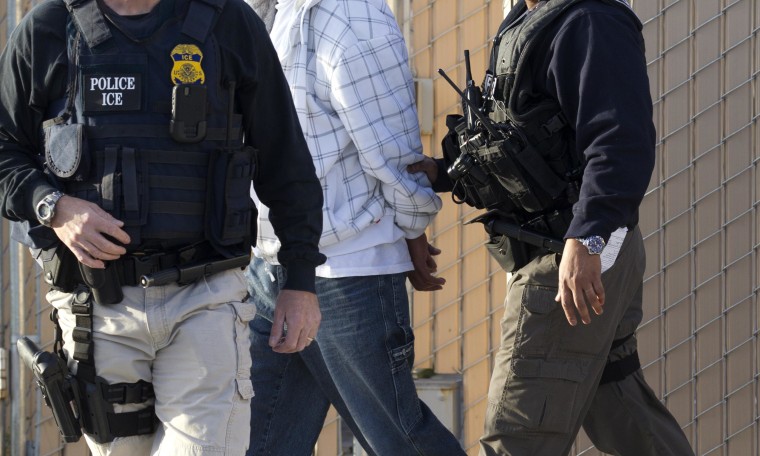House Speaker John Boehner said Tuesday that moving ahead on immigration reform depends on the President showing he’s enforcing the law, which authors of an enforcement analysis said he has done.
In his first news conference since Congress returned from a two-week break, Boehner said the biggest impediment on immigration reform is that Obama has “got to show the American people and the Congress he can implement the law the way it may be passed.”
As Boehner made the statement, the Migration Policy Institute unveiled an analysis concluding Obama has built on enforcement policies of previous administrations and accelerated them, while trying to focus on border security and deportations of criminals.
“The record is pretty clear that the law is being enforced, that enforcement has increased in scope and intensity, increased steadily in the last 10 years or so, including for sure in the last five years,” said Marc Rosenblum, a deputy director at the institute and one of the report's authors.
In addition, some 250 evangelical pastors from 25 states also seemed reluctant to wait for more evidence on Obama’s trustworthiness. On Tuesday they were in Washington, D.C. visiting more than 100 members of Congress, mostly Republicans, and pushing for movement on immigration reform.
“We’ve seen married couples separated, mothers taken away from their children and fathers deported because of the broken immigration system. We need reform and we need it now,” said Rich Nathan, a senior pastor at Vineyard Columbus in Columbus, Ohio.
The analysis released by the non-partisan Migration Policy Institute, which supports immigration reform, found immigration enforcement has toughened in the U.S. since Congress passed a 1996 law to do so. As a result, the number of people formally removed from the U.S. has increased from 70,000 in 1996 to 420,000 in 2012 with steadily increasing enforcement over the years.
Immigration hawks have criticized Obama’s record because of a drop in the number of immigrants apprehended in the interior of the U.S. This is a departure from the Bush administration, which conducted raids on businesses and homes far from the border.
Some have also opposed Obama's decision to extend relief from deportation to young immigrants who are in the country illegally.
But the analysis found this administration has continued the enforcement so that now:
_ An increasing share of people are deported through formal removals (preventing them from returning legally on a visa and if they try to re-enter illegally, they face prison time.)
_ An increasing share of people are formally removed through the Department of Homeland Security and not a judicial process.
_ An increasing share of people apprehended at the border face charges.
But the administration also has:
_ Put in place prosecutorial discretion policies aimed at focusing enforcement on criminals.
“If you are looking to critique the administration, you can find certain people are not crossing ICE’s radar and not being deported and that’s because the administration is focusing efforts mostly at the border,” said Rosenbaum, who served on Obama’s transition team on immigration.
David Aguilar, former National Border Patrol Chief in the Bush administration, called the institute's report tremendous. He said the there was opposition in Border Patrol ranks to using prosecutorial discretion when immigration officials urged it in 2000. "But progressively we recognized ... there was an understanding prosecutorial discretion had a place within the overall system," Aguilar said.
He said prosecutorial discretion is a piece of enforcement, but cautioned that its use be "tight" on the border.
"Ninety-nine percent of the individuals we apprehend within that 100-mile zone (from the borders) are either immediate crossers or in-transit crossers that ... are moving towards the interior of the country," he said.
Doris Meissner, who headed the now-defunct Immigration and Naturalization Service under former President Bill Clinton, said there are "no easy wins" for Obama as he tries to respond to immigration activists who have protested his deportation record. Obama directed Homeland Security Secretary Jeh Johnson to review immigration enforcement policies.
One way may be in tweaking the definitions of a criminal conviction, which now includes a range of crimes from very serious to minor offenses, such as minor traffic violations. But removing immigration crimes from the deportation priority list would be tougher because it would send a signal that once past the border enforcement, there is no accountability for entering illegally.
"I don't think that's probably the set of signals that people that are responsible for enforcement want to send," Meissner said.
